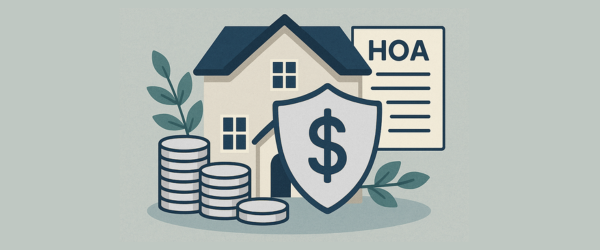Articles
Why Every HOA Needs a Reserve Fund Plan
Is your HOA financially prepared for the future? Engaging in proactive financial planning is essential for ensuring the long-term financial stability of the community. A financial strategy that includes a regularly updated reserve study helps an HOA manage major repairs and replacements while minimizing unexpected special assessments or extreme assessment increases for homeowners.
We are going to break down five reasons why reserve fund planning can prevent costly surprises, improve decision-making, and secure your HOA’s long-term stability.

1. Avoid Costly Surprises
A properly managed reserve fund protects the association from the unexpected. A reserve study is a detailed report created by third-party industry experts. The study is a professional analysis that evaluates the useful life and replacement costs of the HOA’s common components. This tool serves as a guide to help the Board anticipate significant and irregular expenses such as roof replacements, road repaving, renovations, and periodic major repairs to shared amenities. Following the study’s recommended funding plan ensures the community savings plan aligns with future projected costs, reducing the risk of extreme measures such as special assessments or steep increases that frustrate homeowners.
2. Improve Budget Accuracy
Routine Reserve Studies support financial projections with real data based on industry-wide analysis. This improves budgeting accuracy, helping annual budgets remain accurate and predictable while the costs of material and labor change. Studies consider important variables such as inflation and possible interest earnings. This allows the Board to make confident, well-informed financial decisions for the community in the short and long term.
3. Extend the Lifespan of Community Assets
Planning ahead is cheaper than reacting later. Strategic component replacement schedules, guided by reserve study recommendations, can reduce replacement costs over time. By prioritizing spending on components at the proper time, your HOA gets more value from every dollar.
4. An HOA Reserve Fund Strengthens the HOA’s Value
Financially stable HOAs are more attractive to both buyers and lenders. During the purchase of a home, the HOA must provide a disclosure statement that includes the amount of money in the reserve fund. This demonstrates the HOA’s level of financial preparedness to support ongoing maintenance or replacement of its common-area components. When a community has a strong reserve fund, it indicates responsible leadership and potential long-term sustainability.
5. Build Homeowner Confidence
Transparency matters. When Boards share Reserve Study updates along with information about the community’s reserve funding, homeowners see that their finances are being managed with care and foresight, building trust and appreciation for the HOA.

Sound financial planning is not just about reliable numbers; it is about protecting the future of your community. A Reserve Study provides a roadmap, showing what is coming, what it will cost, and how to plan wisely. Without one, communities risk falling into a pattern of reacting to problems instead of preventing them. This can mean surprise expenses, delays in executing projects, potential harm to home values, and homeowner frustration. The same goes for Reserve Funding—consistent, data-driven contributions today protecting your community from financial stress tomorrow.
If reserve planning, capital forecasting, or vendor management becomes complex, boards often partner with a management firm for structured financial reporting and compliance assurance
At AAM, we make the process simple by helping Boards turn data into clear, realistic plans that keep homeowners informed and confident. With thoughtful reserve planning and open communication, your community stays strong today and for years to come.
